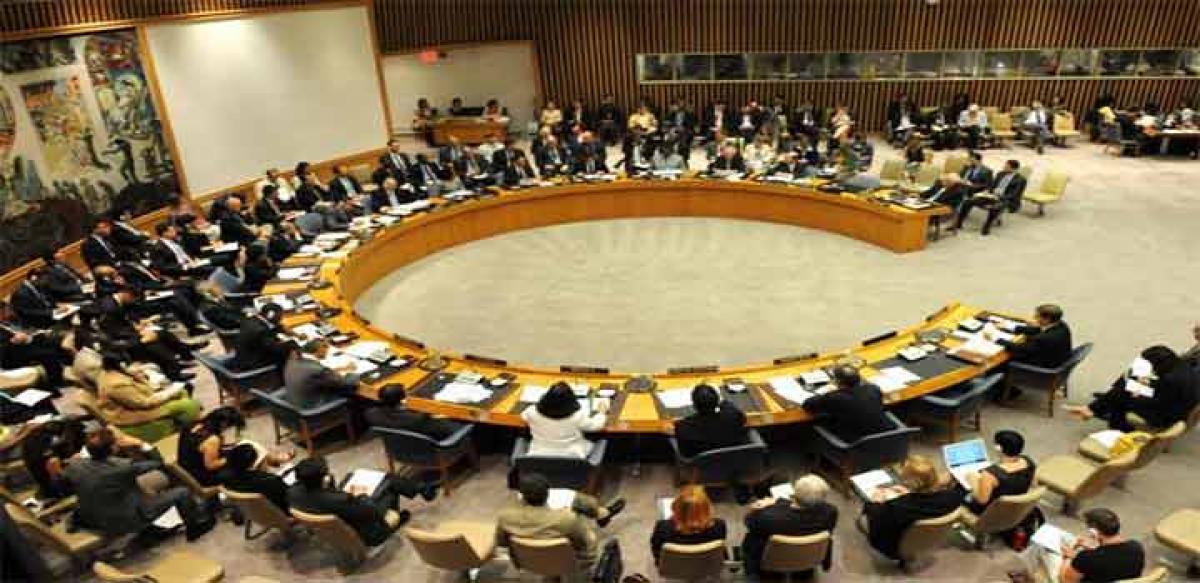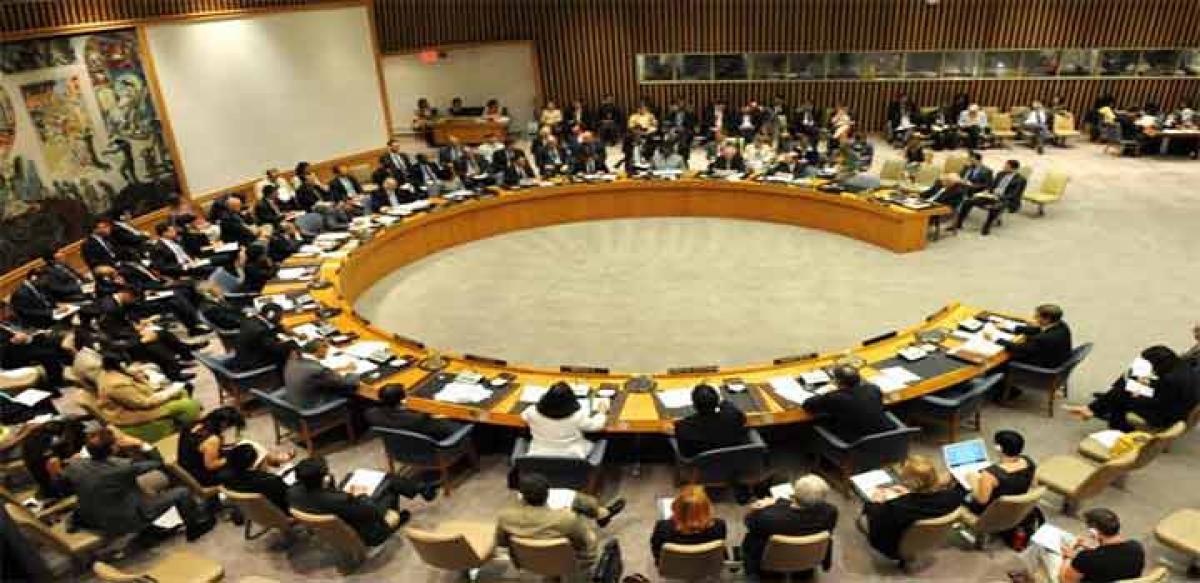Live
- Indian students' concerns about employment, safety, and visas discourage them from applying to UK universities
- Candlelight Concerts Makes a Dazzling Debut in Hyderabad with Sold-Out 'Tribute to Coldplay' Show
- Shubman Gill Sustains Thumb Injury Ahead of Perth Test; Devdutt Padikkal Joins Test Squad
- Unlock Loot Boxes, Diamonds, Skins, and More Exciting Rewards with Garena Free Fire Max Redeem Codes for November 16
- Regarding the DOGE Plan, Vivek Ramaswamy stated, "Elon Musk and I Will Take a Chainsaw to Bureaucracy"
- Sudanese army says repulsed paramilitary forces attack in western Sudan, killing over 80
- Jaipur Open 2024: Baisoya makes a grand comeback to clinch title in marathon playoff against Rashid Khan
- Jamaat-e-Islami Hind President asks cadre to reach out to larger society beyond community
- Why PM mum on Caste Census, removing 50 pc quota limit: Rahul Gandhi
- Barrackpore Municipality Vice-Chairman found dead at home, suicide note suggests blackmail
Just In

x
Highlights
The newspaper headlines last week announced that India is “inching towards” becoming a Permanent Member of the United Nations Security Council, the world’s most privileged and coveted club. But shorn of euphoria, it needs noting that it may be miles away and may or may not make it finally.

A long-standing wish
- For many years now, Indian Prime Ministers have been making a clear pitch for the country’s bid for a permanent seat on the UN Security Council (UNSC). They voiced its desire to whoever visited and wherever Indian leaders went.
- India represents more than 1.2 billion people, has the economic might to back its bid, and thinks it is now relevant enough in all aspects of global politics to hold its own in the UNSC
- It is not going to be easy because the existing members – the Big Five – are not inclined to allow more members into their exclusive ‘club.’
- Besides, India’s giving up non-aligned stance and getting aligned with the west, especially the US, draw fire from Russia and China.
- Add to it Pakistan, India’s inability to carry its neighbours along does not augur well for its effort.
- Nevertheless, the US commitment keeps India’s hopes flickering
The newspaper headlines last week announced that India is “inching towards” becoming a Permanent Member of the United Nations Security Council, the world’s most privileged and coveted club. But shorn of euphoria, it needs noting that it may be miles away and may or may not make it finally.
This caution is needed so as not to raise false hopes. We are part of a vast world community and things do not, and cannot, happen merely because we want it.
This is not to say that we should not aspire and work for it, or that our effort over the years is futile. A country of India’s size, given its geopolitical location and status, its population and contribution to the United Nations since its creation, even before India became free, should be applauded.
For many years now, India has voiced its desire to whoever visited and wherever Indian leaders went and at international meets. India’s aspirations are not a secret, but so are those of others, and so are those of nations who are hell-belt on blocking India.
The first thing is to accept that it is not going to be easy because the existing members – the Big Five – are not inclined to allow more members into their exclusive ‘club,’ despite what they say.
They do not want to lose their privileged status and they do not want competition. They have been prevaricating for years. Despite that, the statement adopted at the UN on September 14 becomes a game-changer.
But that paves the next stage of diplomatic confrontation that is likely to escalate in the coming months and years. This is because, as they say, a foot has just been shoved into the door that had been closed, but cannot remain so for ever. There is certainly some room for optimism, but anything final is a long way off.
Next, in the recent weeks, positions are changing in the fast-changing global situation. Governments of leaders like US President Barack Obama, who firmly advocated India’s permanent presence on the UNSC, are now lukewarm to the idea. Not just India, all aspirants are being cold-shouldered, made to feel like ordinary job applicants.
When Chinese President Xi Jinping last year talked of making the UN broad-based, many Indians interpreted as support to India at the UNSC. Actually, China is opposing India. Similarly, Russia’s Vladimir Putin, another once-robust supporter, has moved away.
Take Pakistan that, along with Russia and China, has protested at the move at the UN, saying that it lacks clarity and is ‘undemocratic.’Its opposition to India is only to be expected, given hostility ever since the two countries got independence.
Pakistan has made no secret of its ambitions to keep India out. It is futile to expect any cooperation. Indeed, India would need to devise a way to bypass Pakistan’s opposition. But that way is not in sight.
This is the ground reality at a forum where each member, howsoever small or big, has a vote. China’s opposition, despite what Xi Jinping said or did not say, is well-known.
China sees India as a competitor in world politics, as a nation that is in confrontation and one that is increasingly aligning itself with the West. China thinks, with some justification, that if at all there is any ‘pivot’ that the USA desires to position in Asia, it is India and that the whole concept of the ‘pivot’ is aimed against China.
It must be remembered that China worked quietly, but resolutely, to thwart India’s Shashi Tharoor being elected the UN Secretary General, to the extent that it supported Ban-ki-Moon of South Korea, a nation that confronts China politically and economically in Asia.
Add to that the Chinese relationship with Pakistan, its “all-weather friend” with which it is closely aligned in all regional and global issues. Here the rapport that Modi and Xi have and many other such factors do not matter.
That India was the first to support China at the UN and even supported its becoming a Permanent Member does not matter anymore than a historical reference. There are no marks for such gestures in global diplomacy.
The Chinese national interests, like Pakistan’s, are firmly against India. Not enough is talked in New Delhi about the fast-changing relations between India and Putin’s Russia.
India’s growing proximity with the West, that is punishing Russia for its ‘invasion’ of Ukraine, has caused a psychological and political schism in Indo-Russian relationship. Take bilateral trade, or take India’s increasing preference for Western defence ware, while Russia remains the largest supplier. This has driven Russia away from India.
No notice is taken of the fact that Russia has begun to sell arms to Pakistan, some of them same as or identical to what it has sold India. For over 50 years, Russia did no business with Pakistan. Now it is selling arms and has just entered into agreements in the energy sector as well, promising to develop Pakistan’s energy sector.
That India is exploring oil in Russia’s Sakhalin is an old story. The next Russian move may be towards Pakistan, or anyone else, away from India.In short, India, once non-aligned, has lost both the erstwhile ‘bhais’, Russia and China.
It is perceived as being ‘aligned’ or ‘multi-aligned’ with the West. Yesterday’s ‘bhais’ are now ready to work against India. The India-Russia-China ‘axis’ that all three had pursued to mutual interest in the last decade does not exist. For India, there are losses and gains.
Modi met smaller nations of the Indian Ocean and Pacific region in the recent months hoping to gain their support (one-nation-one-vote). That would need to be sustained. A strong perception is that India cannot be a global leader unless it can carry its neighbours along. Pakistan is best ruled out.
The Manmohan Singh government, with Pranab Mukherjee as Finance Minister, wooed the others with financial help, projects, preferential trade arrangement. The Modi government, while continuing this, has “looked east,” isolating Pakistan.
The current Pakistani campaign of painting Modi-led India as a hostile ‘Hindu’ entity could impact the thinking on the UNSC among the Islamic nations, working together as Organisation of Islamic Countries (OIC) of which Pakistan is an influential member. Many Islamic nations could stay neutral vis-a-vis India.
India’s many well-wishers may change stand or abstain from voting when the world community, now confronted with the statement that pushes the debate further towards decision-making, comes to grips with the issue. India will have to keep working. For Dilli, a permanent UNSC seat is still ‘door ast.’
By:Mahendra Ved

Next Story
More Stories
ADVERTISEMENT
© 2024 Hyderabad Media House Limited/The Hans India. All rights reserved. Powered by hocalwire.com







